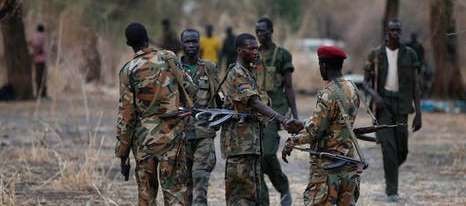Authorities in the Greater Pibor Administrative Area have accused a group of military officers of "fueling and expanding" the ongoing conflict in the Greater Jonglei region.
The Greater Jonglei region is plagued by recurring intercommunal tensions involving the Dinka, Nuer and Murle communities. The cycle of violence is often accompanied by cattle raids, child abductions, and other revenge-inducing crimes.
Peter Lebelek, the secretary-general of the defunct Boma State, said some military officers supplied weapons to civilians involved in the ongoing fighting in the Gumuruk area.
“Senior generals are involved in mobilizing civilians and supplying weapons to Jonglei youths. Yes, I can give you the names of Generals, like Malual Majok Chiengkuac and Kongoor Reec,” Peter told Radio Tamazuj.
The local official urged the national government and the international community to intervene, saying fighting is escalating.
For his part, Lt. Gen. Malual Majok Chiengkuac, the head of the military moral orientation said all the allegations leveled against him were “baseless”.
“If he has proof, then let him come forward. I am a national officer, not a militia or tribal officer. So, let him have the courage to bring this forward,” he said.
Gen. Kongoor Reec Gak, the deputy commander of the army’s 8th infantry division also distanced himself from the ongoing fighting.
“This is not true. I am not a youth leader. I am not in charge of weapons and am not close to weapons. I am just a deputy commander,” he said.
The spokesperson for the Greater Bor Youth Union, Ayuen Guet, denied the army’s involvement in the ongoing inter-communal fighting.
“This problem dates back to the 1950s. More than 16 peace agreements did not hold between us. So we just want to recover our abducted children and cows. No army officers supporting us. We are ordinary youth,” he explained.
David Ngero, the Foreign Relations Secretary for Pibor Youth Union, urged the government to prioritize peace among the communities of the Greater Jonglei region, saying the escalating violence is politically motivated.
Meanwhile, army spokesperson Lul Ruai Koang denied the army’s involvement in the ongoing clashes in the Greater Pibor Administrative Area, saying they are unable to de-escalate the ongoing fighting due to logistical challenges.
“Those are organized local youths. We are not part of the fighting and none of our generals are involved. As the army, our mandate is to protect civilians,” he said.
Edmund Yakani, a civil society activist, condemned the escalating violence in the Greater Jonglei region, urging the government to urgently intervene.
“The conflict has taken a different direction. It is not the cattle raids we knew. As a way forward, we want the government to develop a national strategy on ending these conflicts among our communities,” said Edmund Yakani. “We have gathered information about those who are having hands in the conflict. We will sue them because all these inter-communal conflicts amount to crimes against humanity.”
The civil society activist warned that the ongoing violence could derail the implementation of the peace agreement, if not properly resolved.
Last week, the United Nations said state governors should be appointed to fill a power vacuum and help resolve escalating conflict in places like Jonglei.
“This violence can no longer be pigeonholed as “intercommunal”. Fighters in uniform have been spotted suggesting that organized forces may be joining the conflict which risks unraveling the ceasefire,” David Shearer, the head of the UN mission in South Sudan, said in a statement.
The Dinka and Nuer communities from Jonglei and their Murle neighbors in Pibor have been wrangling leading to cattle raids and child abductions.
Last week, President Salva Kiir formed a committee with a mandate to resolve escalating conflict in Jonglei state and Pibor Administrative Area.




